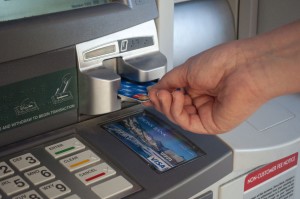Would you like credit or debit?
The debate over which to use and when to use it has been going on for years — especially at college campuses — and it doesn’t look to be ending anytime soon.
In 2008, Jessica Dickler, from CNNMoney.com, reported, “Experts say college campuses are still flooded with credit card flyers and brochures, as issuers attempt to lure valuable first-time cardholders.”

Regulators, however, are trying to do something about it.
“The House Financial Services Committee on Financial Institutions and Consumer Credit held a hearing in June (2008) to address credit card practices affecting college students. Some well-known tragedies have occurred with college students who were over their heads in credit card debt, including a couple of suicides,” Dickler said.
The continued debate begs the following questions: Are credit cards really that bad? Should people stay away from them? Are debit cards the answer?
Thomas Berry, a finance professor at DePaul University in Chicago, points out there are pros and cons to both credit cards and debit cards, and a lot depends on the user.
“The choice of a debit versus credit card really depends on the circumstances of the individual,” Berry said. “With a debit card you are limited to your balance, with the exception of overdrafts, while with credit cards your limit is the card limit, not your bank balance.”
Berry also mentioned potential benefits credit cards have, including building credit history and receiving benefits and rewards.
Debra Ross, a professor of criminal justice at Grand Valley State University in Michigan, also pointed out fraud protection is much more comprehensive with a credit card.
“Most people do not know the difference between credit cards and debit cards,” Ross said. “Debit cards do not have the same protections and are used much more fraudulently than credit cards because they only have three days of protection, whereas a credit card would have 30 to 90 days of protection.”
Fraud protection is important not only to preserve your money but also to preserve your credit score.
Tammy Reavis, a Utah Valley University graduate, learned that the hard way. One night while attending college she left her purse inside her car only to find it missing the next day. Not only was her credit card stolen and used, but so was her checkbook.
“I found out the next morning and cancelled all cards and my bank account,” Reavis said. “The credit cards were easily taken care of, but for the 17 checks that were written I had to write individual fraud statements for each check, and that took months to get fixed. This hurt my credit score for about seven years.”
For those who can control their spending with a credit card, the rewards can be extremely beneficial.
“My experience has been very positive with the rewards,” said Ryne Belliston, a senior at BYU majoring in economy. “I use my cards whenever I can and usually get a couple hundred dollars of rewards each year.”
Belliston went on to list other positives he sees from credit cards.
“I strongly prefer credit cards,” he said. “The money doesn’t come out of my account right away. I can more easily keep track of what I spend, and I get money back.”
Cameron Clark, a senior at BYU majoring in business, also agreed with Berry on building good credit and receiving rewards.
“I got one (credit card) because I knew I wouldn’t have debt problems and wanted to build good credit,” Clark said. “That way, I’ll have a good credit record when I need a loan for houses or such. Also, the fact that I get points toward flying just for using this card to pay for things I would buy anyway sounds good to me.”
However, Berry points out there are also many benefits to using a debit card.
“Debit cards typically are free when you have a (bank) account,” Berry said. “In addition, some merchants may offer a debit card discount since the fees they face are smaller than those they are charged for customers using credit cards.”
Debit cards restrict you to the money you have in your bank account, overdrafts aside. That alone is a major reason many people, students included, prefer debit cards.
“I prefer debit because I’m more conscious and conservative in my spending because it’s money I actually have,” said Leo Vargas, a senior at BYU and a business major. “It’s easy to justify buying something with credit just because you can.”
Debit cards, contrary to their counterpart credit cards, tend to have a relatively good reputation, which is enticing for many consumers.
“I have never had a credit card, and I am really afraid of them,” said Jessica Egbert, a junior at UVU. “I know I need to build credit, but I’m hesitant to get a credit card because of debt horror stories.”
Credit cards can be good or bad, and it’s the same with debit cards. Berry points to spending habits as a determining factor of whether to go with credit or debit.
“For those who get into credit card problems, the first step would be to change buying habits and maybe only use one card and use it only sparingly,” Berry said.
If people can control their money, then a credit card might be the way to go. If that’s a struggle, then a debit card could be the best option. Either way, the debate will continue to rage on.




